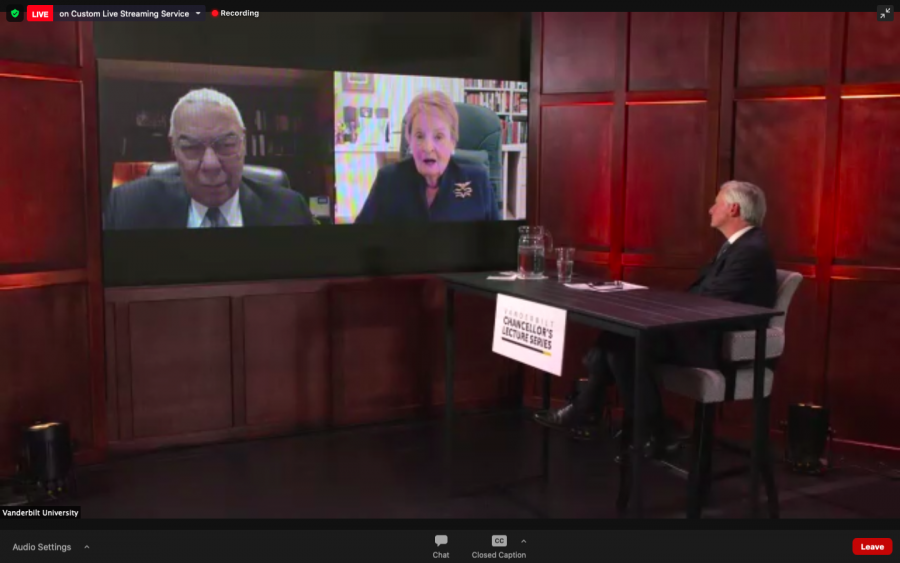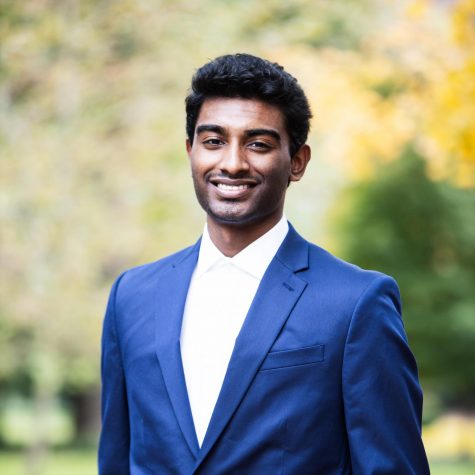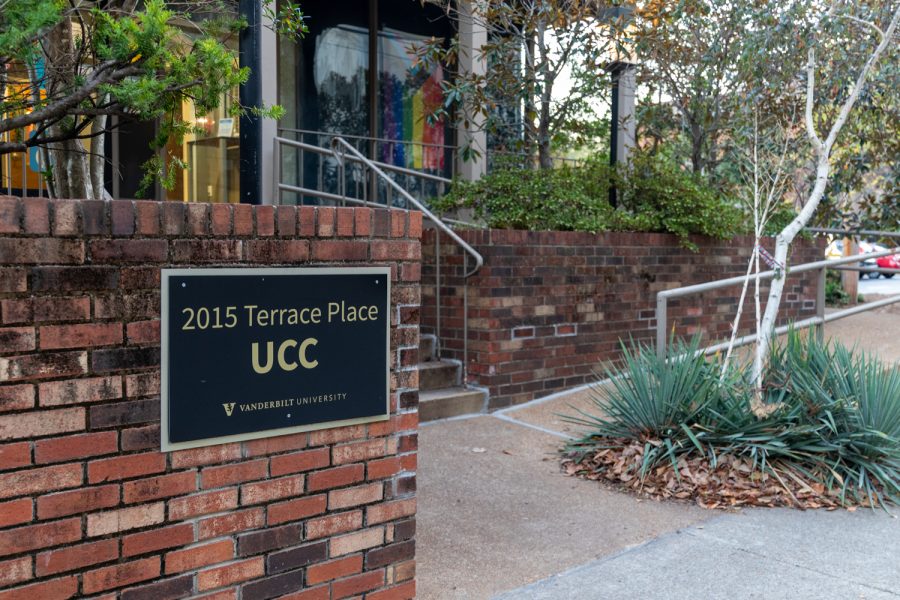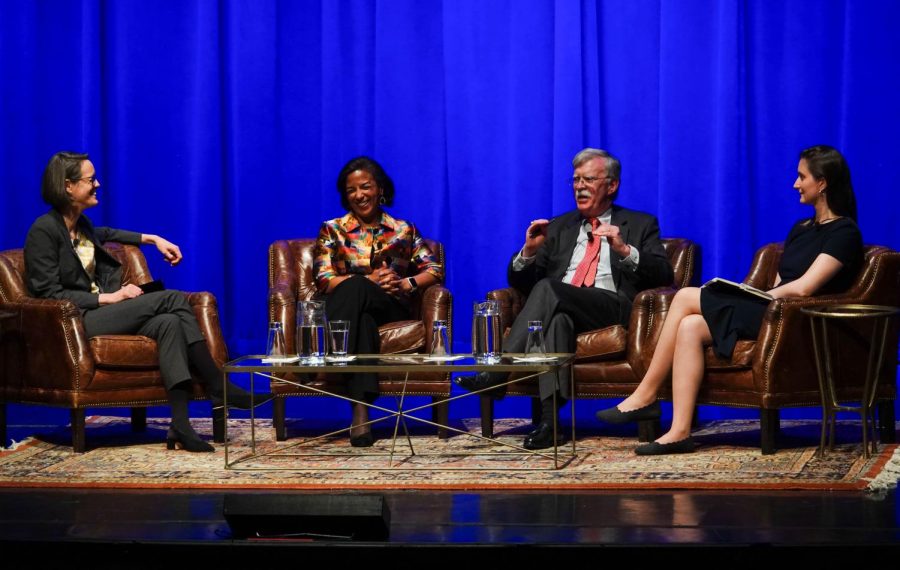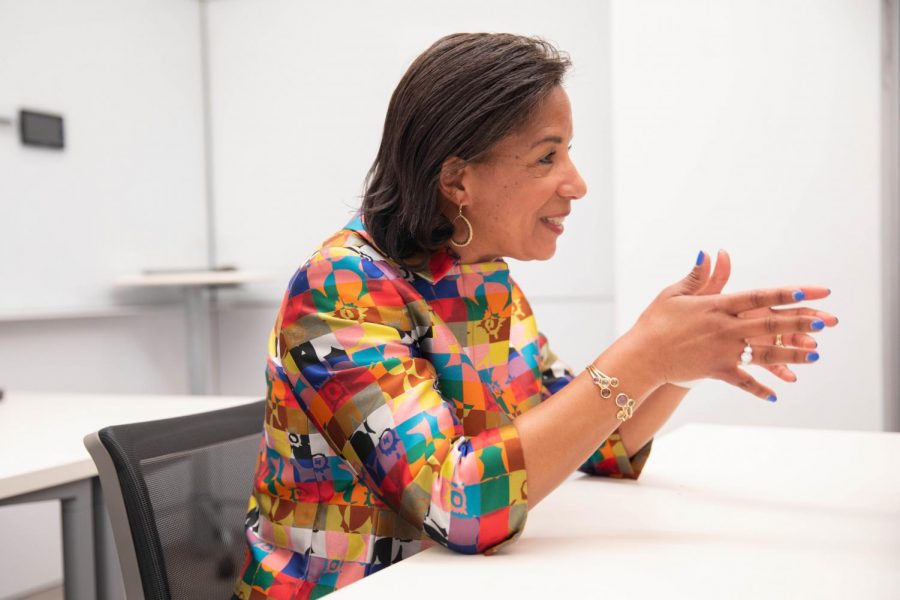The first Chancellor’s Lecture Series event on Monday, Nov. 16, at 5:30 p.m. CST featured former secretaries of state Dr. Madeleine Albright and Gen. Colin Powell. The event was moderated by Jon Meacham, the Carolyn T. and Robert M. Rogers Chair in American Presidency at Vanderbilt.
Albright served as the 64th Secretary of State under President Clinton and was the first female secretary of state. Prior to this role, she served on the National Security Council under President Carter and was appointed U.S. ambassador to the United Nations by Clinton.
Powell, a retired four-star general, was the 65th Secretary of State under President Bush after serving as the chairman of the Joint Chiefs of Staff.
Chancellor Daniel Diermeier introduced the Speaker Series, his first as chancellor at Vanderbilt, then introduced Professor Meacham, Powell and Albright.
America’s Current International Position
Meachem began by asking the speakers to share how they feel America stands in the world.
Albright answered first, speaking about her belief that the United States can return to its former prominence as a pillar of democracy and an example to the world. She also reflected on what the United States represented to her as a young immigrant who came to the United States fleeing communism.
“I believe that deep down the city on the hill is there, but it has been obscured recently by behavior that puts to question what America’s role in the world is,” Albright said.
Powell, too, expressed his belief that the America in which he grew up is still there. He lamented the breakdown in civil discourse among Americans of opposing views. He also reflected on the decline of America’s international prestige as a result of the current administration’s foreign policy.
“Will we survive? Of course, we’ll survive. We’re Americans,” Powell said.
The Presidential Transition
Next, Meacham asked the speakers what they would do as secretaries of state if they were informed that a foreign leader had lost an election and refused to concede.
Albright responded that she would have deep concern about such a situation. Powell openly criticized Trump’s refusal to concede the election and discussed the unprecedented nature of this event in American history.
“It has really shaken up our country something awful,” Powell said. “We also have to think about the 70 million people who did vote for Mr. Trump.”
He expressed his hope that America can reclaim its position in the world as a leader of freedom and democracy.
Albright stressed that leaders can serve to exacerbate the divisions that currently mark the American political climate.
“It’s important to understand that this was not a division created by Trump; it existed, and he exacerbated it,” Albright said.
She explained that she believes the way to address these divisions and unify the country is to listen and have civilized discussions across the aisle. Powell added that many of the problems facing the United States, such as immigration, poverty and climate change, existed before the current administration.
Priorities for Biden and America in the World
Powell expressed his belief that Biden and his administration should focus on public health and the economic impact of COVID-19. Additionally, Powell cited immigration and education as priorities for the team.
“The country needs work. We know how to do it—we can do it,” Powell said. “We have to start sharing the wealth better. We have to start fixing the things that we know are broken.”
On another note, Albright said that while she felt that globalization is currently seen as negative, it is important for Americans to understand the importance of strong international relations. She emphasized that globalization is especially economically beneficial, but noted that it does not come problem-free.
“Globalization does have a downside. Many of us have benefited from it, but it’s faceless,” Albright said. “People want to know what their identities are, and I think we need to recognize that as we work on the diversity of this country and understanding that we can be proud of our identity without thinking that we hate another identity.”
Relationships with Russia and China
Albright stressed the complexity of the relationship between the United States and China. Additionally, she said that it is essential not to view China as an enemy, but rather as a country with which we can both compete and cooperate. However, she maintained that China’s increasing power has allowed them to fill the foreign policy vacuum America created under the Trump administration.
“We have to take into consideration that China is the rising power,” Albright said. “There’s no question about it.”
Albright then turned to Russia, a country that she spent most of her career dealing with. Though she argued that its glory days are long over, she still expressed concern about the ways in which Russia has attempted to interfere with and undermine American democratic institutions and distance America from its allies, particularly in reference to the 2016 presidential election.
“At the moment, we have created a hostile atmosphere, and we see everything as a zero-sum game,” Albright said. “The truth is that compromise is not a bad word.”
Powell expressed doubt that North Korea, Iran or Russia would attack the United States and argued that this is not something that the United States needs to be overly concerned about.
Per Powell, there is increasing concern about China as a national security threat. He also argued that the United States should not be so worried about China militarily because of how focused they are on continuing to improve their economy.
“We have to think twice about whether China really has any interest in attacking us,” Powell said. “We’ve got to stop treating everyone as an enemy, especially those who might have some modest capability but have absolutely no intention of attacking the United States of America. And that’s most nations in the world.”
New Foreign Policy Consensus
Meacham mentioned the Cold War consensus, which refers to the general consensus on foreign policy goals during the Cold War, that shaped Albright and Powell’s perspectives on foreign policy and posited whether there might be a new foreign policy consensus.
Albright responded that she believes there will be a new consensus and that she views the 21st century as a new era. She said she sees this era of American policy as being shaped by the terrorist attacks on Sep. 11, 2001, and the COVID-19 crisis. Albright pointed to a distinct feature of this generation: the importance of understanding science and technology. She also focused on the role of information and the impact of disinformation on policymaking and democracy.
Powell argued for the importance of maintaining a strong military to avoid future wars and ensuring that other nations know that America has no intention of aggression against them.
“It’s a dangerous world but not a dangerous world of the kind that existed before,” Powell said.
The Role of Higher Education in Addressing the Current Challenges Facing America
Powell stated that he holds confidence in the competency of the contemporary higher education system but expressed worry about the quality of K-12 education. He stressed that those first 12 years of government-mandated education are the most important so that students can ultimately pursue higher education.
Albright lamented the characterization of people as educated or uneducated and expressed her belief that this contributes to the deep divisions in the United States.
Separately, she expressed her belief in an “international education” and the importance of overcoming immigration and visa challenges to continue including foreign students at American universities. She also added that learning how to act effectively on the international stage requires studying a broader curriculum which includes science, health and religion.
“Now, I do think that people need to know that the world isn’t flat, that science is very important, that they understand the religious background of various countries, and really broaden the whole relationship so that we are preparing our students for the multicultural, multiethnic, many-countries world that they’re going to be working in,” Albright said.

